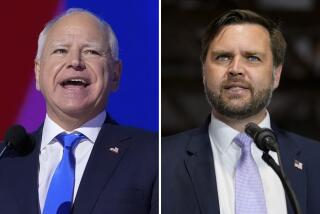A fresh round of questions for Obama and Romney
- Share via
The questions asked at Tuesday night’s presidential debate will be left to a coterie of undecided voters assembled by Gallup pollsters, so don’t be surprised if they invite President Obama and his Republican opponent, former Massachusetts Gov. Mitt Romney, to pander to address concerns unique to their lines of work, their favorite causes or the problems they face as individuals. For example, that might include questions about whether the government is doing enough about cancer or Alzheimer’s disease, or why Washington bailed out the big banks but not a local business whose line of credit dried up.
Personally, I like those questions. They’re a reminder of what people think government ought to focus on, as opposed to what Washington seems to spend all of its time on.
Some inquiries are more illuminating than others, however. And the candidates covered some topics so thoroughly in the first go-round -- most notably Romney’s proposed tax cuts and the two candidates’ thoughts about Medicare -- that it’s worth moving onto fresh ground. Here are a few questions I hope to hear Tuesday night. Some are overdue for asking. And some aim to discern whether Romney has actually moved toward the political center, or merely softened his tone:
TRANSCRIPT: First presidential debate
The dominant image of Congress is one of partisan gridlock. The coming election may shift the balance a bit, but both sides will still have considerable power to obstruct. We’ve heard presidents promise for years to bring a new bipartisan spirit to Washington, but the situation only seems to get worse. How do you plan to persuade lawmakers from the other party to work with you?
In about 20 years, Social Security is projected to run out of the money needed to pay the full benefits promised to retirees. Should younger Americans start planning to receive a smaller guaranteed retirement benefit from the federal government?
The federal government also guarantees health-insurance coverage for people in poverty, the disabled and the elderly. Growing healthcare costs, however, are the main challenge for the budget over the long term. Should the government maintain that guarantee regardless of the cost? If not, what’s the alternative?
DEBATE LOG: Vice Presidential Debate
The recession has caused a surge in the long-term unemployed, who have a particularly hard time re-entering the job market. What, if anything, would you try to do for these Americans?
Median household income started dropping before the recession, and it remains well below its peak in the late 1990s. What, if anything, should the government do about that?
Income inequality -- the gap between the amount of income collected by high-income families vs. the amount collected by everyone else -- has risen fairly steadily for more than four decades, and is at its highest level on record in the United States. Why do you think that’s happening, and what, if anything, should the government do about it?
Those are my suggestions. Add yours to the comments field below!
ALSO:
Kinsley: The politics of common sense
Presidential debate: The trick is to be pugnacious and personable
Presidential debate: Will the Obama of ‘change’ show up this time?
Follow Jon Healey on Twitter @jcahealey
More to Read
A cure for the common opinion
Get thought-provoking perspectives with our weekly newsletter.
You may occasionally receive promotional content from the Los Angeles Times.










